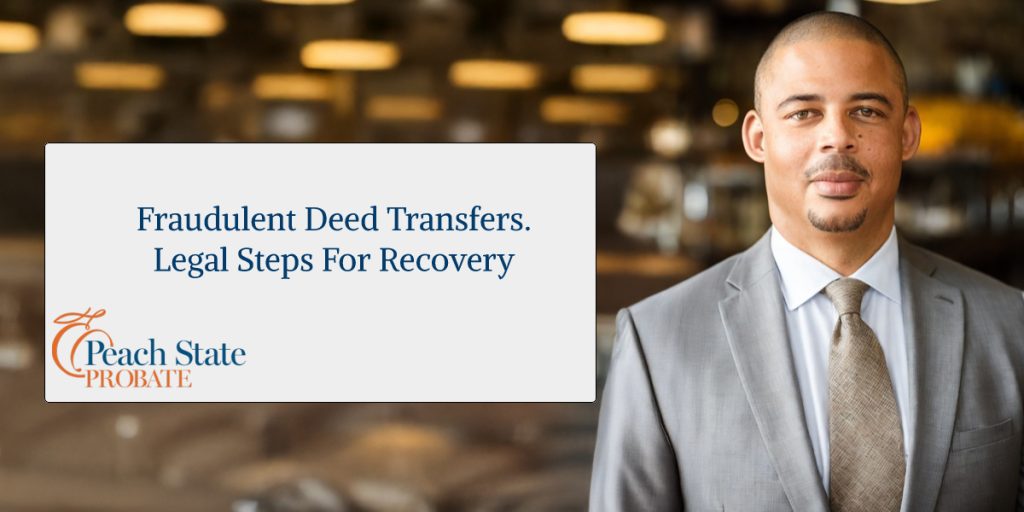## Understanding Fraudulent Deed Transfers: Legal Steps for Recovery
Fraudulent deed transfers refer to transactions where property titles have been altered or conveyed under false pretenses, usually with the intent to deceive or defraud a party involved. These actions can severely impact rightful property owners and create complex legal challenges. The manipulation of property deeds can occur through various means such as forgery, coercion, or even the misrepresentation of facts. Understanding the legal implications and the steps necessary for recovery is crucial for anyone who may find themselves victimized by such deceitful practices.
When a fraudulent deed transfer occurs, it often leaves victims in a state of financial distress and emotional turmoil. Recovering from such an event requires not only an understanding of legal rights but also a keen awareness of the potential consequences of inaction. Property owners need to know that their stakes in their properties are protected under the law and that they can take definitive steps to reclaim what is rightfully theirs.
Effective legal recourse begins with a clear understanding of fraudulent deed transfers, their implications, and the available remedies. The process can be intricate, which highlights the importance of having sound legal assistance. Peach State Probate is dedicated to helping clients in Georgia navigate the complexities associated with recovery from fraudulent deed transfers.
## The Significance of Fraudulent Deed Transfers
Fraudulent deed transfers are not merely legal technicalities; they represent serious offenses that can lead to substantial financial losses for innocent property owners. The far-reaching impact of these fraudulent acts can devastate a person’s financial future and alter their property ownership rights irrevocably. This is why the topic of fraudulent deed transfers holds significant importance in real estate law and personal property rights.
The consequences of fraudulent deed transfers extend beyond immediate financial losses. Victims often face prolonged legal battles, emotional stress, and significant disruptions to their family lives. Many individuals may find themselves dealing with the collapse of their financial security, and the emotional weight of fighting to recover stolen property can take a considerable toll. Legal protections must be in place to safeguard property owners from such misconduct, and it is essential to understand these protections fully.
Proactive education on fraudulent deed transfers enables property owners to guard against becoming victims in the first place. Awareness of the signs of potential fraud and understanding the legal mechanisms available can act as a first line of defense. It is vital for property owners to remain vigilant and informed about the laws surrounding property transfers to mitigate risks and recover swiftly should fraud occur.
## Legal Framework Surrounding Fraudulent Deed Transfers
Georgia’s legal framework surrounding fraudulent deed transfers comprises various statutes and common law precedents designed to protect property rights. The integrity of deed transfers is maintained through regulations that require certain formalities, including notarization and witnessing. When these formalities are bypassed or manipulated, it opens the door to fraudulent practices.
One fundamental legal avenue available to victims of fraudulent deed transfers is the ability to file a quiet title action. This legal remedy seeks to establish clear ownership of property and effectively remove any conflicting claims resulting from fraudulent transfers. The burden of proof lies on the property owner to demonstrate the fraudulent nature of the deed transfer, which necessitates thorough documentation and evidence-gathering.
Additionally, victims of fraudulent transactions may also pursue claims for damages against those found liable for perpetrating the fraud. This may include recovering legal fees, costs associated with the actions taken to rectify the situation, and even pursuit of compensatory damages. Consulting with a legal professional can help victims understand the appropriate legal remedies applicable to their unique circumstances.
## Real-World Instances of Fraudulent Deed Transfers
Real-world examples of fraudulent deed transfers serve to illustrate the scope and severity of this issue. One noteworthy case involved an individual impersonating a property owner to transfer the title of a valuable piece of real estate. By producing forged documents and misrepresenting their relationship to the rightful owner, the fraudster managed to deceive a title company, resulting in the unauthorized sale of the property. The rightful owner faced a complex legal battle to reclaim their property, a situation that emphasizes the need for vigilance in real estate dealings.
Another case involved elderly victims where caregivers or family members exploited their trust. By having them sign over property deeds under the pretense of estate planning or financial management, these individuals fell victim to fraudulent transfers that stripped them of their real estate holdings. Unfortunately, such situations often go unnoticed until it is too late, revealing the emotional trauma and financial impact on those affected.
These cases highlight the dangers posed by fraudulent deed transfers and the variety of schemes employed by those willing to exploit trust and legality for personal gain. The need for education, awareness, and legal recourse becomes paramount for anyone involved in property ownership or transactions. Victims must seek proper representation to navigate these murky waters and recover rightful ownership.
## Actions to Take if You Suspect Fraudulent Deed Transfers
If you suspect that a fraudulent deed transfer has occurred, it is imperative to take immediate action. The sooner a victim acts, the easier it may be to gather the necessary evidence and apply the appropriate legal remedies. The first step typically involves investigating the deed in question to gauge its authenticity. This may include reviewing notarial seals, signatures, and any discrepancies in the public records related to the property.
An essential action is to promptly notify local law enforcement if fraud is suspected. A police report can serve as an important part of any legal proceedings you may initiate in the future. Furthermore, establishing communication with your title company or attorney can help to ensure appropriate legal steps are being taken to address the fraudulent transfer and begin the recovery process.
Finally, maintaining meticulous records of all documents, communications, and proceedings related to the suspected fraud will be crucial. A thorough documentation process not only strengthens your case but also aids your legal representation in building a strong argument against the fraudulent offending parties. The compilation of evidence serves as a reliable foundation for illustrating your ownership rights and the illegitimacy of the fraudulent deed transfer.
## Common Pitfalls to Avoid in Fraudulent Deed Cases
Navigating the complexities of fraudulent deed transfers can introduce various challenges, and several common pitfalls may complicate recovery efforts. One significant mistake victims often make is failing to act quickly after discovering the fraud. Time plays a crucial role in legal proceedings, and delays can weaken a case or complicate the ability to reclaim property. Therefore, victims should avoid procrastination in investigating and initiating legal actions.
Another prevalent pitfall is underestimating the importance of legal representation. Many individuals may attempt to handle matters independently, believing they can manage the situation without professional assistance. However, the nuances of property law and the necessary legal strategies for overcoming fraudulent claims often require deep knowledge and experience. Engaging with a qualified attorney not only strengthens a victim’s position but also increases the likelihood of a favorable outcome.
Additionally, victims should avoid making concessions or accepting unofficial settlements without a clear understanding of their rights. Heretofore, parties attempting to mediate may offer terms that seem favorable but could ultimately hinder full recovery. Having a legal representative can help ensure that any agreements are beneficial and that any offers presented align with the victim’s best interests.
## Knowing When to Consult an Attorney
Recognizing the right moment to consult an attorney regarding fraudulent deed transfers is crucial for effective legal action. A key indicator that legal consultation is necessary arises when discrepancies in property documentation or ownership become apparent. If questions about legitimacy or doubts arise regarding a deed, an attorney can provide insights into the situation and direct you on how to proceed.
Another significant factor prompting the need for legal assistance is when an individual faces response actions from another party disputing their ownership. For example, if a claim arises asserting rights to the property held by a potential fraudster or party linked to the fraudulent deed transfer, it is imperative to seek legal counsel immediately. An attorney will be positioned to mount a defense against such claims and work to restore rightful ownership.
In instances where a victim feels overwhelmed by the complexities brought about by fraudulent deed transfers—be it emotional or procedural—consulting an attorney is also advised. The presence of legal professionals can alleviate burdens, helping victims navigate the legal system, manage paperwork, negotiate settlements, and prepare for litigation if necessary.
## Advantages of Legal Representation in Fraudulent Deed Recovery
Legal representation is pivotal for individuals working to recover property lost through fraudulent deed transfers. A trained attorney can dissect the intricacies of the case, expertly navigate local laws, and shape a legal strategy tailored to the unique circumstances surrounding each individual case. Their detailed understanding of property law empowers them to construct a well-founded argument that demonstrates ownership rights.
One of the primary advantages of legal representation is experience in handling similar cases. An attorney experienced in fraudulent deed cases can anticipate challenges, gather relevant documentation, and assess the potential legal avenues available for recovery. They can also negotiate with opposing parties to either come to a settlement or prepare for litigation if necessary. This level of preparedness is invaluable for victims of fraudulent transfers confronted with complicated legal maneuvers.
Moreover, having an attorney can alleviate the emotional burden placed on victims. The stress of facing fraudulent claims, potential loss of property, and the associated emotional toll can be overwhelming. Legal representation ensures victims have a knowledgeable advocate at their side, allowing them to focus on other critical aspects of their lives while their lawyer works diligently on their behalf.
## How Peach State Probate Supports Clients Facing Fraudulent Deed Transfers
Peach State Probate stands out as a leading legal resource for clients navigating the intricate landscape of fraudulent deed transfers. With a deep understanding of property law and commitment to serving victims, our team is uniquely positioned to assist clients throughout Georgia in reclaiming their rightful property ownership. Our thorough approach ensures that each case receives tailored attention and skilled advocacy.
The process begins with an initial consultation where clients are able to freely discuss their concerns and experiences related to fraudulent deed transfers. During this dialogue, Peach State Probate attorneys offer insights into the legal landscape, available remedies, and next steps. This foundational understanding serves as a gateway for victims to make informed decisions about their paths forward.
Additionally, Peach State Probate employs diligent research and fact-gathering strategies designed to build a solid case. Our legal team works tirelessly to examine public records, gather necessary documentation, and analyze the circumstances surrounding each fraudulent deed transfer. With a focus on crafting compelling arguments, our attorneys diligently advocate for clients during negotiations and litigation, maximizing the likelihood of recovery.




